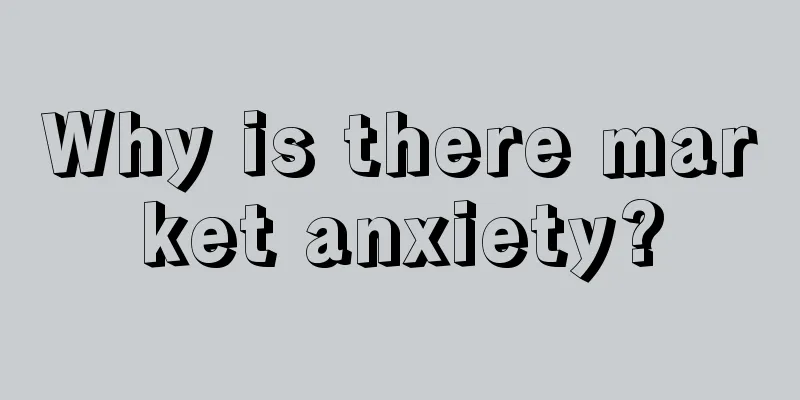Why is there market anxiety?

|
In the comments at the end of the articles in the past few days, many readers have expressed their anxiety about the current market conditions. I guess the main cause of anxiety is the general decline in the overall market. I actually shared my thoughts on this in last Friday’s article, and also in an earlier article: If this round of Bitcoin is just like this and turns downward from now on, then we would have made a plan a long time ago - hold on to the Bitcoin in our hands and wait for another 4 years, and then make plans for the next cycle. This is true for Bitcoin, and even more so for Ethereum. During the online discussion last Saturday, several listeners expressed their concerns about the sluggish price of Ethereum. I also expressed my regret when I shared my views at that time, but I also emphasized that I am not worried at all about holding Ethereum. I still say the same thing: if you don’t even dare to buy Ethereum, then there is really no need to waste your time and energy in this ecosystem. In addition, I also said that at least half of the crypto assets in hand should be allocated in Bitcoin and Ethereum. If investors really do this, then we might as well take a look at the status of the assets in their hands first. Let's look at the worst case scenario first: Suppose an investor initially has $5,000 in capital, and he uses $2,500 to buy Ethereum. The remaining $2,500 in assets has now become zero. We use the Ethereum fixed investment price of US$2,500 as the cost price, and his total assets now (based on the current Ethereum price of US$3,200) are US$3,200. Let’s look at a best-case scenario: Assuming an investor spends $2,500 of the $5,000 on random purchases, all of which goes to zero, and the remaining $2,500 is all spent on Bitcoin, with a cost price of $35,000. Then, the assets he has now (based on the current Bitcoin price of $95,000) are $6,784. So in the worst case scenario, our current assets are between $3,200 and $6,700. Generally speaking, if we invest regularly, the average cost price of Ethereum is likely to be less than $2,500, and the average cost price of Bitcoin is likely to be less than $35,000. And as long as we are not too unlucky, the remaining 50% of our assets will not be completely reduced to zero, right? So no matter how bad things get, we will be better off than $3,200 right? Even if our current assets are only $3,200, I fully believe that in another four years, the price of Ethereum will definitely not be what it is today. So as long as we are prepared for the worst and are optimistic about the crypto ecosystem in the medium and long term, I don’t see any reason to be anxious no matter how you look at it. The above estimate is based on short-term prices - my least favorite way to assess value. Moreover, the above calculation method assumes that this round of market trend will end here. Besides, can we judge that the market trend has ended now? I can't judge. All I know is that the decline in the market in the past few days has not affected the development of new things in the crypto ecosystem, has not affected the fundamentals of many projects, and has not affected the team building of many projects. If this is the case, why are we so obsessed with short-term price fluctuations and unwilling to focus our energy on more noteworthy and valuable areas? I hope that our readers can put aside their emotions when they are anxious, and ask themselves whether the situations that may happen today and in the future are what we have anticipated in advance? If so, have we made preparations for these unexpected situations in advance? If you do it well, there is really no need to worry. |
<<: Bitwise: Corporate Bitcoin buying is an overlooked trend
Recommend
Having plans but no execution
Sometimes, some people do have a lot of plans, bu...
Why do people say that moles on hands can resolve many afflictions?
Suffering represents disease and suffering. Altho...
What is the relationship between the position of the mole at the corner of the mouth and destiny?
Although most of the moles on our faces are not g...
Ungrateful man's face
Ungrateful man's face Men's narrow forehe...
What is the fate of a woman with a Sichuan-shaped wrinkle on her brow? What is the personality of a woman with a Sichuan-shaped wrinkle on her brow?
Nowadays, people pay great attention to their app...
The disruptor: Bitcoin
The selling of Bitcoin in China reached its peak ...
Low temperature climate, cheap electricity, Siberia, mined Bitcoin at -40 degrees Celsius
As the value of Bitcoin continues to soar, more a...
A blessing in disguise: these faces can always turn misfortune into fortune
When facing life, we always say that a blessing i...
Human Rights Foundation says 1.2 billion people are experiencing double-digit inflation, many looking to Bitcoin as a solution
Human Rights Foundation says 1.2 billion people a...
Small miners suffer before halving
Text | Vincent Nuclear Finance Report: After a co...
Physiognomy teaches you how to identify the sex of the fetus
In Chinese physiognomy, there are many ways to te...
Jealousy traits
1. The forehead is too narrow In physiognomy, if ...
He "jumped" from a hydropower station to a Bitcoin "mine": he checks the central bank's official website every day
As a native of Leshan, Sichuan, Lei Ke had been w...
The face of a man with a miserable life
Starting from some aspects, we actually need to i...
The importance of moles on lips is obvious
The importance of lips in facial structure is obv...









